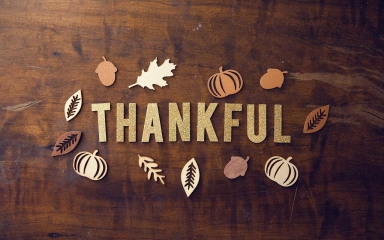Our offices will be closed on January 1, 2025, in recognition of the New Years Holiday.
Retrain your brain for a more thankful Thanksgiving

This Thanksgiving, what are you grateful for?
If you have to reach a little deeper this year to find your answer, don’t feel alone. It’s easy to be thankful in good times, but this year—like no other in recent memory—so many have been touched by illness, job loss, natural disaster or the chaos of daily life, which makes it a little more difficult to muster a sense of gratitude.
When life gets this challenging, is it even possible to feel grateful? Yes, according to Robert Emmons, author of “Gratitude Works! A 21-Day Program for Creating Emotional Prosperity” and a leading scientific expert on gratitude.
“Not only will a grateful attitude help—it is essential,” says Emmons. “In fact, it is precisely under crisis conditions when we have the most to gain by a grateful perspective on life.”
This is your brain on gratitude
The science of gratitude (yes, there is such a thing) has proven that practicing gratitude on a regular basis can change your brain, resulting in increased happiness, improved health and relationships, better sleep, less stress, decreased anxiety and depression, lower pain levels, and increased productivity.
How? First, two definitions: Serotonin is the hormone that regulates our mood and feelings of well-being and happiness. Dopamine is the chemical that’s released during pleasurable situations, stimulating us to seek out more of those situations. The simple act of finding things to be grateful for increases the production of serotonin, while the practice of gratitude stimulates dopamine—which encourages your brain to repeat that great feeling. So, in essence, the regular practice of gratitude can help rewire your brain.
How to practice gratitude
You don’t need complex rituals to increase your thankfulness. Even if you don’t send them, the mere act of writing thank-you notes or letters to those who are important in your life can help you turn your focus away from negative feelings and thoughts. Or, if you’re a journaler, keeping a gratitude journal and adding entries a few times a week can help remind you of what you’re thankful for.
The results of studies with groups that focused on writing letters of gratitude showed better mental health four weeks after the study. And even better mental health 12 weeks after the writing activities—compared to groups that didn’t write letters.
Even though it won’t happen overnight, you can retrain your brain to focus on the positive, not the negative. It’s a practice that even those of us who are more fortunate can take a lesson from—at Thanksgiving and all year round.




